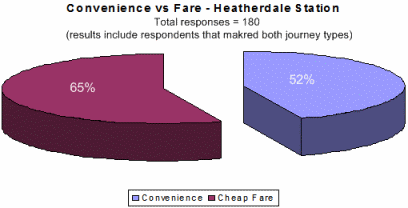The Eastern Transport Coalition (ETC) will be conducting a postcard survey on Tuesday 10 October to call on the State Government to review the fare structure used across the Melbourne metropolitan area.
Councillor Alex Makin represents Maroondah City Council on the ETC, and will be participating in the survey as part of the ETC’s long term campaign to improve transport choices in the East.
“The ETC will be conducting their survey at six different points across the eastern suburbs with the aim of encouraging the State Government to conduct a review of public transport zones and fares,” said Cr Makin.
“I will be at Heatherdale Station on the morning of Tuesday 10th of October to do my part handing out postcards and talking with patrons of the public transport service. I want to hear more about what people think of public transport fares,” said Cr Makin.
Chair of the Eastern Transport Coalition, Cr Mick Van De Vreede says the ETC is calling for fairer fares for Melburnians.
“We don’t believe that the current fare structure encourages people to use public transport as well as it could. Given there is a new ticketing system coming into place in 2007 it would be sensible to introduce fairer fares at the same time,” said Cr Van De Vreede.
“The current fare structure puts in place a number of distortions, for instance we have seen:
- Station car parks at zone boundaries targeted by consumers seeking to avoid the higher costs,
- The east of Melbourne having a Zone 3 which does not exist in the north or west,
- Melbournians living on boundaries having to pay for two zones when the same journey in other locations will cost a fare for one zone only.
“The ETC does not expect the system to be free, however the fare structure should be studied to see how it can work to encourage greater patronage.
“Melbourne has always been a leader with its multi-modal tickets, it’s now time to utilise technology to take the next step.
“A good example of what can be done is EastLink. Along EastLink drivers will have 13 separate tolling points which means that they will only pay for the little bit they use. There is even a 20 per cent discount for local trips on weekends. Public transport users deserve the same flexibility, if fact they need it if public transport is going to compete with EastLink,” said Cr Van De Vreede.
“It would be sensible if the Government announced a review of the fare and zone system before the new ticketing structure comes into place,” Cr Makin concluded.
The ETC consists of seven Councils in Melbourne’s east, representing over 940,000 residents who are conducting a long term campaign to improve transport choices.
I look forward to meeting commuters at Heatherdale Station next Tuesday to further the campaign for fair public transport fares.
